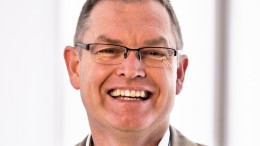 Dale Stephenson is pastor of Australia’s largest Baptist church, Crossway, in Melbourne’s East Burwood. As a lapsed atheist, Dale has a keen insight into how unbelievers perceive Christianity. Eternity’s John Sandeman spoke to him this month.
Dale Stephenson is pastor of Australia’s largest Baptist church, Crossway, in Melbourne’s East Burwood. As a lapsed atheist, Dale has a keen insight into how unbelievers perceive Christianity. Eternity’s John Sandeman spoke to him this month.
John Sandeman: Let’s begin with a plug. Recently you told readers of Eternity daily news service at biblesociety.org.au that Peter Jensen gave an unflustered, gracious, calm response on Q&A. If you were on Q&A, what would be the main point you would like to get across?
Dale Stephenson: If I was on Q&A I would only be able to address the issues that were put before me through the questions and discussion. Ultimately, I would be there as Jesus’ representative so the things that I share would seek to honour him and be informed by my faith. With a little room to move, I would like to point out that Jesus is as relevant as tomorrow, and that the church in Australia is undergoing something of a reformation. The death of traditionalism and the rebirth of fresher ways is real and demonstrable across the nation. I would like to point out that faith is different from blind faith. I would rather describe it as ‘reasoned trust.’ With an atheist background, I became convinced, therefore I believed in Jesus rather than leaping out into the darkness.
JS: Imagine you are a doctor. Your patient is Australian Christianity. What is your diagnosis?
DS: My diagnosis would be to give a serious health warning. While there are parts of the body that are doing quite well, they are rare. For the better part, Australian Christianity would do well to conduct a serious review. The way that the good news about Jesus is carried by every single Christian needs to be considered. The good news only made it to us because former generations stewarded it well.
We are the carriers of the message of Jesus for our day. I would encourage us to look to the Christians in countries like China and India, where there is a rampant spread of the gospel because the followers of Jesus are living intimately with him and are sharing him with their networks. Such a significant spread of the Gospel is not beyond Australia but it requires Australian Christians to adjust their ways. Ultimately, it comes down to intimacy with Jesus and a collective commitment to reach our individual cities, nation and the nations.
JS: Does the treatment of Christians in our media reflect a community that is harder to be Christian in?
DS: There is a clear and regular negative predisposition from the media towards both Christians and the Christian faith. The treatment of Peter Jensen on Q&A was but one example of that. For the enormously positive contribution that the Christian community makes across the nation in multiple sectors, including welfare and education, the media represents this same portion of the community very poorly.
For the better part it is a message of doom and gloom. Most would not realise that there are more people at church on a weekend than would be at the AFL across the nation for example. Or that the greatest clustering of any community is, firstly, the educational bodies and secondly, the church. The Christian contribution to our nation is enormous and the Government knows it well but the media rarely portrays it as such.
JS: What works these days in engaging our neighbours as a church?
DS: Care and relevance will never grow old. Neither will our capacity to engage culture with relevant responses to the age old questions like “How can there be a loving and powerful God when there is so much suffering in the world?” The more a church is prepared to speak the language of the people and engage with the sort of questions that the community are asking, the stronger the engagement.
You have 4,000 people a week in your church. Does the responsibility get to you?
I love being part of a big church. I know that it is not everyone’s preference but I love it. Only a certain type of person is wired up in such a way that they thrive in the complexities of leadership, people and culture development, and I am one of those people. I find my role highly stimulating and treat it as a calling from God.
JS: Who keeps you honest?
DS: I have been married for 27 years to the most wonderful person in the world. Edi, my wife, and our four children help to keep integrity between the message and culture of church, and life at home and my private world.
At church there is a transparent accountability that I have to the Church Board, and they are a tremendously godly group of people. They also help me to stay focused on the most important things. Additionally, I have a couple of mentors who speak into my world and ask great questions to ensure that I do not lose my way.
Email This Story
Why not send this to a friend?
